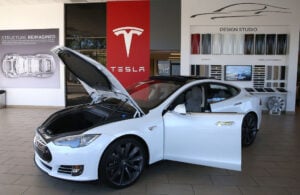Tesla Smashes Profit Expectations, Stock Price Soars, Hobbled Elon Musk Critics Pause Decade-Long Whine
Tesla is not just a money-making machine. Tesla aims to change something fundamental about our society, for the better, and it has to get consistently profitable to do it.

(Photo by Justin Sullivan/Getty Images)
As of last Thursday, Tesla was the second most shorted stock on Wall Street, right after Apple Inc. Short sellers had $10.5 billion bet against Tesla.
These vampires, er, I mean noble champions of marketplace accountability who are in no way systematically draining the platelets out of what remains of capitalism, took a collective bath to the tune of $1.4 billion last Thursday morning, when Tesla’s stock price skyrocketed by 17 percent. Tesla shares continued their upward trajectory as they crept steadily higher on Friday, to end the week at just above $328 per share.

Early Adopters Of Legal AI Gaining Competitive Edge In Marketplace
Tesla stock closed out 2018 at a price of $332.80 per share, so as of the end of last week, the short sellers who hung on for the ride these last 10 months are still just barely in the black year-to-date. But given the reasons for Tesla’s precipitous October climb, it’s not looking good for those betting against the electric automaker.
After hours last Wednesday, Tesla reported a profit of $1.86 per share, crushing the anticipated loss of 42 cents per share predicted by analysts. Tesla also posted a cash balance increase to $5.3 billion, and CEO Elon Musk promised continued advancements in self-driving technology and the 2020 rollout of a more affordable Tesla SUV model. With production of Model 3 sedans set to begin in the near future at Tesla’s new Shanghai factory, and another Gigafactory in the works in Europe, Tesla certainly has costs to control, but also a growing platform for continued expansion.
Normally, there is no shortage of Tesla and Elon Musk critics, including here at ATL and its sister sites. But they were comparatively quiet late last week.
It makes sense that short sellers want to trash Tesla at every chance they get. They make money when Tesla does poorly, just as Tesla shareholders (like me) make money when Tesla does well. Huge, profitable industries which would be threatened by the success of an electric vehicle maker and clean energy proponent also seem to be unoptimistic about Tesla — analysts at the three biggest banks funding development of fossil fuel resources are, not surprisingly perhaps, pretty negative about Tesla’s prospects. People’s loudly expressed viewpoints tend to gravitate in the direction of their financial interests.
Sponsored

Early Adopters Of Legal AI Gaining Competitive Edge In Marketplace

The Business Case For AI At Your Law Firm


Navigating Financial Success by Avoiding Common Pitfalls and Maximizing Firm Performance

Is The Future Of Law Distributed? Lessons From The Tech Adoption Curve
And maybe none of this would be a problem if we just all let go of the illusion that we have to base our decisions on what any of these people say. If you think I’m full of shit and that Tesla sucks, well, then don’t buy any Tesla stock. Likewise, if you think that continuing to burn ancient plankton to go places is the wave of the future, just keep at it. I myself will be looking into a Tesla as soon as I’m done driving my old Chevy into the ground (unless GM or one of the other automakers can convince me otherwise, by coming up with something pretty compelling in their own EV department, which is kind of what capitalism is supposed to be all about in the first place).
Theoretically, the existence of short selling has its benefits. Providing more independent research than the analysts at those big investment banks we were talking about (or at least research biased in the opposite direction), encouraging (inciting?) more vigorous debates in the financial markets which promote transparency, and being more diligent about uncovering corporate fraud have all been touted as services short sellers afford the markets (albeit only as side effects of the pursuit of their own self-interest). Benefits notwithstanding, we still don’t have to like short sellers, short selling, or pessimism.
In my view at least, unlike so many of the other ticker symbols building little mountains and valleys in our brokerage accounts, Tesla is not just a money-making machine. Tesla aims to change something fundamental about our society, for the better, and it has to get consistently profitable to do it. When the first U.S. railway was chartered to transport passengers and freight commercially in 1827, there were plenty of skeptics who said a steam engine could never work along steep, winding grades. As construction commenced, there was probably some guy from the livery stable yelling that this whole railroad thing was doomed to fail. But investors didn’t listen to the naysayers then, and they shouldn’t now. Sometimes progress is built on a little faith. And especially in light of last week’s earnings report, Elon Musk still has mine.
Jonathan Wolf is a litigation associate at a midsize, full-service Minnesota firm. He also teaches as an adjunct writing professor at Mitchell Hamline School of Law, has written for a wide variety of publications, and makes it both his business and his pleasure to be financially and scientifically literate. Any views he expresses are probably pure gold, but are nonetheless solely his own and should not be attributed to any organization with which he is affiliated. He wouldn’t want to share the credit anyway. He can be reached at jon_wolf@hotmail.com.
Sponsored

Legal AI: 3 Steps Law Firms Should Take Now








